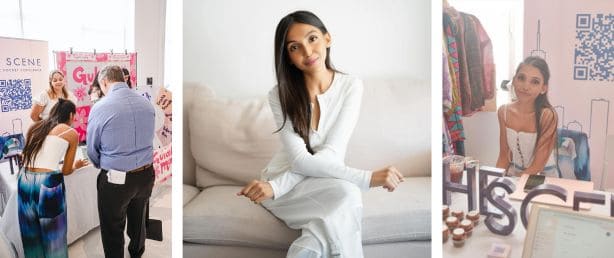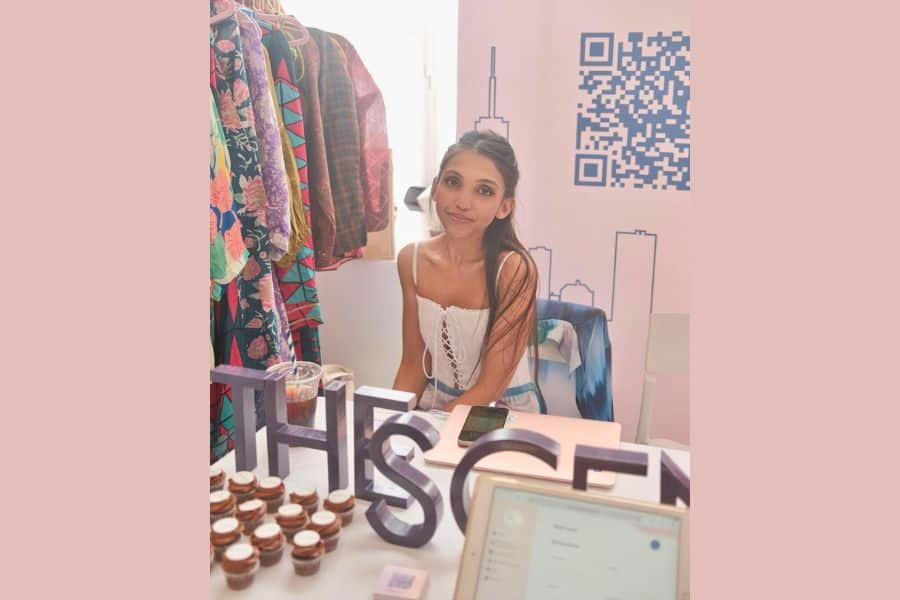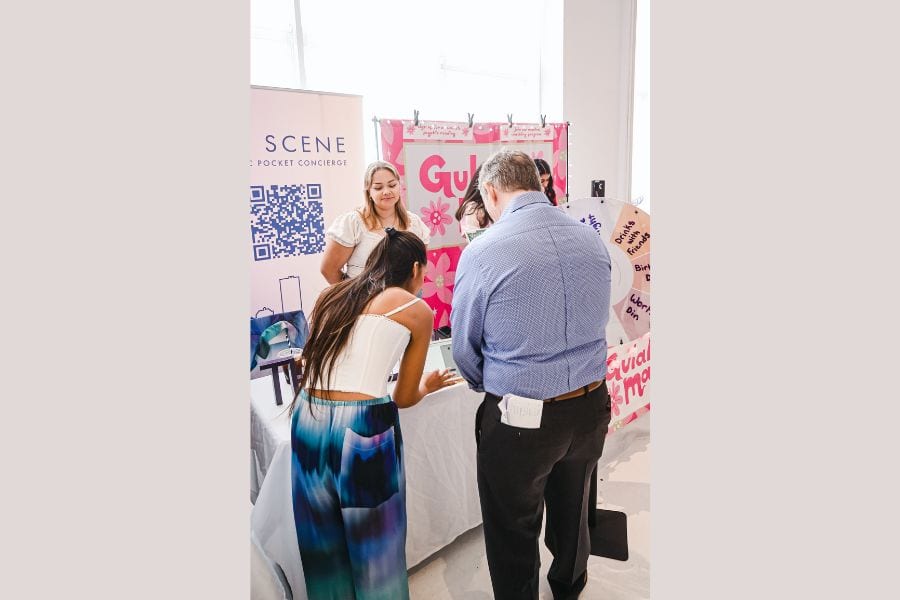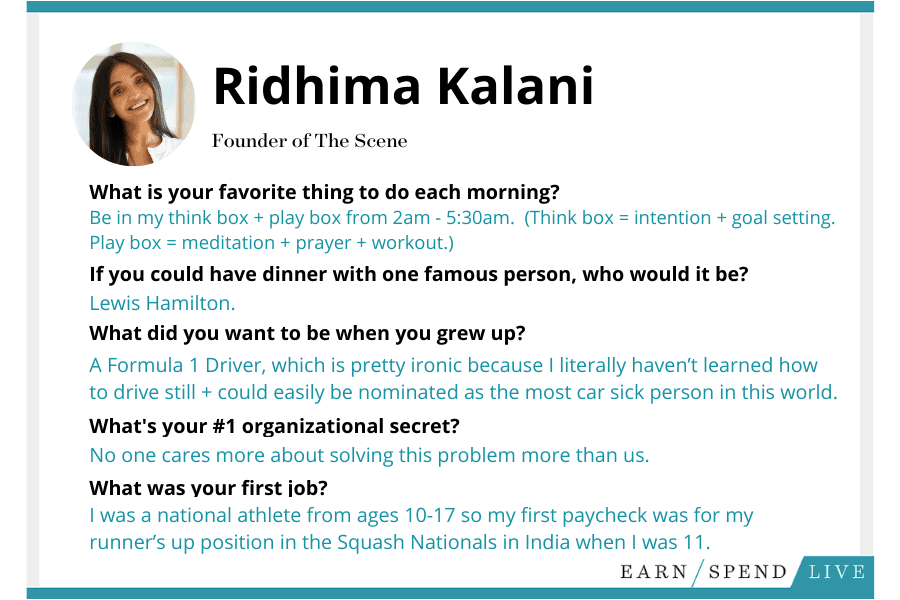Real Talk With Ridhima Kalani, Founder of The Scene

Introducing Ridhima Kalani, the visionary founder of The Scene, a New York-based AI-powered pocket concierge. Armed with a background in Marketing and Brand Management, Ridhima’s journey began in 2020 during the pandemic, evolving from Instagram restaurant reviews to a full-fledged concierge service. Motivated by a passion for curating perfect experiences, Ridhima navigates the challenges of leadership, constantly unlearning and adapting. The Scene’s success is evident, and plans for the future include global expansion, enhancing AI technology, and helping the restaurant industry with innovative solutions. Despite challenges faced as a woman in leadership, she perseveres, driven by her commitment to making The Scene the ultimate FOMO eliminator.
Name: Ridhima Kalani
Location: New York
Title: Founder
Company: The Scene
What it is: an AI-powered pocket concierge
Educational Background: Marketing & Brand Management
What does a typical day look like for you?
2 AM – Wake up
2 AM – 4 AM Coffee, Prayer, Meditation, Intention Setting (Personal and Professional)
4 AM – 5:30 AM – Workout
5:30 AM – 6 AM: Shower / get ready
6 AM – 9/10 AM: The crux of founder duties, aka whatever I absolutely have to accomplish that day to get the company from point A to point B. Sometimes, it’s me working on revenue; other days, it’s fundraising; other days, it can be marketing. My phone is typically on silent or on airplane for this part; I need laser focus.
10 AM – 1 PM: External calls – aka calls with people that are not on the Scene team: restaurant owners, investors, partnerships/ events calls, etc.
1 PM – 4 PM: Internal calls – calls with my CTO, Marketing Team, etc.
4 PM – 6 PM: Content + social media time – 95% of The Scene’s users find us organically through Instagram, so 4-6 PM is literally IG time. Interacting with my followers/DMs, creating content that I think will do well, managing on-going social media partnerships we already have in place, etc.
6 PM – 8 PM: Phone on airplane mode or silent, quick breath work session, followed by dinner, watching a show, and going to sleep.
What’s your favorite thing about what you do?
Definitely opening our DMs and seeing people reach out about how The Scene curated an experience for them that blew their minds. Or waking up to like 6-7 story tags, from a person who went on a date night curated by The Scene and just tagged The Scene in everything without us even asking—just truly seeing people take joy in using The Scene.

What’s the backstory of your journey to founding The Scene New York?
Navigating the Pandemic
I started working on The Scene in Jan 2020. I was earning a master’s degree in marketing and working a part-time marketing job at Venus ET Fleur. Even then, I wanted to build a product like The Scene, but I had no funding to do so. So, I simply made an Instagram account (@thescenenewyork) where I would post my own restaurant reviews daily with images of NYC-based establishments. Simultaneously, I did some software development research about what it would take to build something like The Scene.
In March 2020, we were hit by the pandemic. My classes went remote, and so did my job. I moved back to India to stay with my parents. My vision and grit were massively tested because we couldn’t see a world that looked normal back then. But I couldn’t give up on the vision, and I wanted to do whatever I could to keep the Instagram account alive. I started posting “at home” recipes of specialty dishes and cocktails from NYC-based restaurants to keep my users entertained. I also decided to support restaurants that needed it most by re-posting and promoting their GoFundMe pages on my Instagram account, with a focus on POC-owned restaurants.
Pioneering a VIP Concierge
In July 2020, when some NYC restaurants started reopening, I noticed my Instagram account started getting tons of messages—people were asking me for recommendations and reservations, and they were asking me which restaurants were following safety protocols. I noticed a heightened demand for a product like The Scene. So, I decided to expand my own personal concierge services at the time and create a new VIP $100/ month concierge service where members had to be approved, similar to SoHo House.
I gained new customers who paid $100/month to have me handle everything from recommendations to reservations. I also launched and successfully crowdfunded $20k on IFUNDWOMEN to fund the software development costs for The Scene. Essentially, in the crux of a pandemic when OpenTable lost 100M users, we gained 60, who were willing to pay $100/month and crowdfund our software development, at a $0 CAC. We proved that there was a demand for a product like The Scene when there was quite literally a health risk involved without using it.
What motivated you to establish a company like this?
So, I grew up in a joint family in a small town in India. The most important thing to my family has always been taking care of each other. This value was deeply ingrained in me, and I was somehow always put in charge of planning the birthdays, anniversaries, etc. I just had a knack for thoughtfulness, taking every single detail into account about the person’s preferences and putting together something beautiful.
When I came to NYC, I was 17 and I made contacts quickly in the restaurant & nightlife industry. I put my passion for curating the perfect experiences for people to work and became a personal concierge. It started with girls in my sorority, then all of NYU, and before I knew it, I was a personal concierge to hundreds. I would wake up to texts from unknown numbers. The number one question I would keep getting is, “What’s the vibe at a place going to be like?”. I always found that people were asking me to match them per “vibes” at places and rarely per cuisine or area.
OpenTable and Resy were only curating recommendations per cuisine, area, and reservation time. That’s when I realized that there was a gap in the market for a service that matched people with the perfect vibe for them—like a dating app but for restaurants. I also came across these insane stats—there are over 25,000 restaurants in New York City, and it takes the average group just over 60 minutes to plan a night out. That’s when the idea for building something like The Scene was planted.

What is it like running a company?
A whole lot of learning and, more importantly, unlearning. I grew up in a small town in India, and I went to a British school there for the first 12 years of my life. I was taught that you should be subservient in many ways and always listen to those around you. We were asked to walk in a “straight file,” and if you even went slightly out of line from the norm, you were publicly punished, shamed, and made an example of.
As you can imagine, being a founder goes against most of these values. You have to speak up—a lot of times for yourself. You have to ask for what you want, and you have to manage the situation with hard work and resilience if you are not getting what you want. Also, you have to have tough conversations with your team, friends, family, and countless other people where you put the company first every single day. I feel constantly guilty if I am being totally honest because so much of being a founder goes against so many of my core instincts.
But I try and remind myself that just because I have these conditioned and almost forced instincts from when I was 12, 1) does not make them the right instincts to have, 2) does not make them my core values or what I stand by today as a 28-year-old early stage, solo, immigrant founder in NYC. So running a company is mostly unlearning—plain and simple. Unlearning literally everything I knew to be “correct”. And learning what it’s like to ask for and act like what I actually want and who I want to be, rather than who I was.
What’s your biggest takeaway from your role in the company?
If you don’t take care of yourself, you don’t care about your company. Undermining your needs, even for a few days, will almost always show up in some way for your company as a consequence. I can’t even begin to list out the amount of times I’ve had to learn this the hard way so now it’s pretty much ingrained. I don’t really go more than 3-4 days (if it’s genuinely crazy busy for me) without checking in and making sure I am truly doing okay.
Real talk—I saw that your company uses AI integration. Do customers interact with an AI bot? Can you talk a little more about that?
Our Artificial Intelligence integration is actually incorporated into the algorithm in two ways: 1) When you submit your preferences. We then match you with restaurants that best fit your preferences, like a dating app but for restaurants and people, rather than people and people. 2) When you type in what you’re looking for. In which case, your recommendations show up, much like when you input a search in ChatGPT.
We are still very much at MVP (minimal viable product) stage, so we don’t have any AI chatbots, or regular chatbots for that matter, on the platform, but it’s something we plan to introduce in later stages after the mobile app. The end goal of The Scene is to be as close to a global pocket concierge as we can get while keeping the cost at $8.99/month or less. So when you are chained to the desk, in the middle of a million meetings, and can’t call the restaurant, we are here to solve that problem for you.
What unique challenges have you faced as a woman in a leadership position, and how have you overcome them?
A Transparent Reflection
To be transparent, this is something I have struggled to speak on for a long time. I think there’s a certain guilt and/or fear of seeming ungrateful and of how I’ll be perceived while answering this question. Prefacing this answer with the fact that truly…writing this out was not easy. Also, there are a few more layers to my experience than just “woman”. I am a woman of color and an immigrant, early-stage founder. I am not sure how these different layers cloud other people’s experience of me and vice versa.
Generally, I think the number one challenge, and really the only one, is consistently being talked down to or being spoken to like I am an idiot (by men 9 times out of 10). The context/incidents of these situations are so blatantly sexist. A recent incident occurred on an investor call where the investor was essentially talking down to me the entire time, unwilling to hear what I had to say. Now, most founders, male or female, have had this happen to them. It’s just the toxic nature of investor calls. But I have to share how this call was very different from many other investor calls I have had.
Confronting Sexism in Interactions
This particular VC didn’t let me even finish the initial two line pitch of the company. He was saying A LOT, and all of it was completely out of context with what we do. Simply because he didn’t want to hear what I had to say. At some point, I managed to cut him off and finally explain a little bit of what we actually do, at which point I got his head nodding. He went on to ask multiple questions that made him seem ignorant and sexist. I was more than happy to forgo any possible future business arrangements with him.
Such instances happen multiple times a week— investor calls are just one format. It can come up during a call with a restaurant owner when trying to show them how you can get them more reservations or help them cut costs. All you get in return is talked down to. In the rare instance that I get to open my Raya app, sometimes it can pop off in a chat. If I, a woman, ask a man what he does for a living as the first question on a dating app, that instantly makes me a gold digger. It’s somehow completely okay for every man to question me from the start and ask in detail about my startup and how it makes money. Even if he knows nothing about the industry.
Don’t get me wrong—a lot of this just comes with being a founder. Your work will be pulled apart constantly. But there are times when it’s not people’s business. There are other times that there is a certain tone that I can’t put a finger on exactly, but whenever these moments happen, I feel certain that if I was white and male, all the things happening would be unfolding very, very differently.
Empowering Responses
How do I overcome this? I am not sure. I think writing this out was slightly therapeutic, so maybe that’s how. But also in taking my power back and just not responding to such people once they have revealed themselves and not taking such partnerships forward even if they bring “obvious” value in that moment (not because I am incapable of putting my company first but because I refuse to be that person/that woman that enables these behaviors, especially after the life I have lived and the education I have had). I also take my power back in calling people out in the most professionally appropriate way possible if I happen to have the time, energy, and format to do so.

Can you discuss any significant milestones or achievements that your company has reached?
Last year, in November 2022, we went from 500 users to 1000 users in less than two weeks. We were really working on understanding our users at this time, improving the product, and also marketing it in the right ways and at the right places. We also saw our daily active user percentage jump from 3% to 13%, our weekly active user percentage jump from 13% to 73%, and our monthly active user percentage jump from 70% to 100%.
As of today, we have 12K users, and we have stabilized at a 100% MAU, 73% WAU and 13% DAU. We also have 20.6k IG followers and over 100 positive reviews from our users (we’ve been growing by 300-700 followers daily completely organically, so by the time this interview comes out, I am hoping we will have crossed the 30k milestone). Investors at Antler, a global VC, quoted our recommendations algorithm as “the best in the business” and we’ve been featured in Medium, Yahoo Finance, Grit Daily, and more.
How has your degree helped you in your career?
My undergraduate degree is in Public Relations. PR agencies are super expensive and honestly not always worth it for start-ups. It’s because of my undergrad degree and work experience in PR that I can write pretty catchy press releases myself and secure features in prominent news sources without having to pay the price of an agency or an agent. I can also see things more long-term and from a PR lens for the company, which is always helpful in making decisions.
My master’s degree is in Marketing and Brand Management. This program had tons of courses on finance, entrepreneurship, and leadership as well. I couldn’t have been better set for my role. That being said, I would have to admit the technical courses—finance, digital marketing, Google Ads, etc.—were way more helpful than the vaguer courses, such as Entrepreneurship and Leadership. I use the technical information I learned all the time and can save some costs on marketing & financial experts. Also, because I worked in marketing for a few years, I try my best to keep our marketing costs as close to $0 as possible. I believe if the product can be viral organically, that should be the ultimate goal.
I’d say reaching 12k users as a web app, almost completely organically, is a pretty good testament to the value the app is providing. With regards to the vaguer courses such as Entrepreneurship and Leadership—that is genuinely best learned on the job and there’s not much you can do to prepare you for such areas until you are fully in it. I’ve definitely made some mistakes in these areas early on, and truly, there was no way to know what I was even doing wrong that any course could have taught me. I had to make those mistakes and I am a much better entrepreneur and leader of it.
How would you describe your work/life balance?
There is none. I don’t like to strive for goals that just put more pressure on me, my schedule, my lifestyle. I know work, my mental health, and my physical health all come first. So, I have figured out a very specific type of schedule (as shared in Question #1) that works for me and works to drive these areas. I find social life and dating life pretty draining, so I just don’t make time for those two at all.
I have no social life or dating life 99% of the year. If I wanted to have it all, I maybe could, but there’s no point striving to accommodate things that drain you. My closest circle knows that the only two things I set aside time for are 1) quick coffee meetups with friends in the daytime between work meetings or 2) a co-working day as a way to spend time. Other than that, if you happen to see me out, it’s because of work. It is either a networking event, a Scene event, a paid restaurant shoot, or someplace I have gone to scout users/investors/partnerships. But again, this is rare.

Please share with us the best piece of career advice you’ve received.
Honestly, that there’s a lot of bad advice out there, and your attention is your biggest gift, so you should use it wisely. Literally every single reel and TikTok is a person sitting behind one of those podcast mics and with those giant headphones. There’s way too much advice, and there’s no way to know whether it’s relevant to you. For instance, I once heard a founder say on an Instagram reel that an imperfect plan executed today is better than a perfect plan executed tomorrow. I actually totally agree with this person. However, this has gotten me in trouble sometimes because this can lead to launching things with glitches or setting a piece of content live without sharing it with partners involved, etc.
These vague pieces of advice appear as 15-30-second snippets on our social media without context, and we tend to apply them to everything, ending up in tough situations. So I don’t really have any advice, but I would just choose what you give your attention to wisely. Lastly, this is not advice, more of a review if anything, but seriously—the 2 AM wake-up time has changed my life and supercharged my start-up’s success tenfold.
Do you have any big career plans on the horizon?
Too many to count:
- Launching our mobile app.
- Improving our Artificial Intelligence and Machine Learning tech to make the product more personalized and as close to an easy and affordable pocket concierge as possible.
- Growing our software dev team so we can scale faster.
- Launching more creative features to help get POC-owned restaurants more reservations and exposure.
- Launching in Singapore and Dubai.
- Bringing on a technical co-founder who’s as passionate about solving this problem as I am.
- Launching our restaurant portal to save restaurants from the insane fees and other inefficiencies at Openable & Resy + provide premium value and data.
- Launching our B2B software so hotels and larger concierge services can use The Scene and expedite their processes rather than having real people spend hours doing things The Scene can do in seconds.
- Creating jobs/internships for international students and people on non-immigrant work visas. They seriously have it the toughest and don’t deserve to.
Where do you see your company in five years?
As a global pocket concierge, spanning over 22 cities, the ultimate FOMO eliminator and the app that makes sure you spend more time living your best life rather than planning it. I see The Scene planning and curating for millions with our B2C app, helping other businesses— such as hotels and larger concierge services—expedite their processes with our B2B software, and solving problems for restaurants through our restaurant portal. At the moment, Resy and OpenTable charge $1 per table and $250 per month just to be on the platform. This is killing restaurants.
In addition, there’s a lot of press about the fact that OpenTable and Resy are making restaurants buy their customers back again and again. What this means is that, for example, you type in “BONDST reservation” on Google, but because the first link that comes up is OpenTable’s BONDST link, you will now be making that reservation through OpenTable. This, in turn, obligates BONDST to give $1 from your reservation to OpenTable when, in reality, you had no intention of visiting OpenTable’s website. You knew you wanted the BONDST reservation from the start and would have happily made the reservation from the restaurant’s website.
With The Scene’s restaurant portal, we won’t be charging any monthly fee to be on the platform. We will also be giving restaurants data on search trends so they can optimize their own marketing campaigns to gain more customers.



Show Comments +